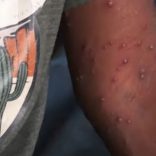Mozambique: UEM hands over 504 laptops to STEM students
Mozambique: Plans afoot to use Lenacapavir in 2026 to stop HIV from spreading – Watch

Screen grab: TVM
Mozambique plans to introduce treatment with Lenacapavir in 2026 to prevent Human Immunodeficiency Virus (HIV) infection, with up to 90,000 initial injectable doses, health authorities said on Tuesday.
“We have been negotiating the issue of introducing the drug for pre-exposure prophylaxis, which is Lenacapavir. We’re thinking that perhaps between 30,000 and 40,000 people could benefit from this initial phase (…) This means that we could perhaps have between 80,000 and 90,000 doses, as it’s administered every two years,” explained the executive secretary of the National Council for Combating Aids (CNCS), Francisco Mbofana, in Maputo.
Lenacapavir is an injectable drug used to prevent HIV infection, with studies showing almost 100% efficacy in preventing transmission of the virus. The use of which was recommended by the WHO on 14 July to reformulate the global response to the virus.
Speaking to the press during the meeting of the National Council to Combat AIDS, Mbofana said that in 2024, the health sector distributed a record 170 million condoms throughout the country. For the coming years, the challenge is to maintain this level, particularly at a time when the health sector is facing cuts in external funding.
‘We’ll have to find ways of [making], if there are currently one million [condoms] in the “kit”, go up to two million, to ensure that these levels that we’ve achieved so far can be continued (…), the extreme challenge is to get these condoms to where people need them,’ he said.
Data shared by the CNCS indicates that more than two million Mozambicans are on antiretroviral treatment.
The country has missed the target of reaching 95% of people diagnosed with HIV, as well as expanding antiretroviral treatment and suppressing viral load, and the challenge of reversing the trend remains.
‘Far from what would be the 95% target, concerning people who know they are on treatment, we are at 83%, and concerning people who are on treatment, who have achieved viral suppression, we are at 76%,’ said the secretary.
In 2024, the country registered 92,000 new HIV infections, making it the second highest infection rate in the African region.












Leave a Reply
Be the First to Comment!
You must be logged in to post a comment.
You must be logged in to post a comment.